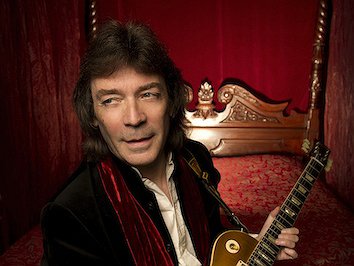When did you start composing - and what or who were your early passions and influences?
I started composing at age twelve. My early influences were the Shadows, Segovia, the Beatles and the Stones.
What do you personally consider to be incisive moments in your work and/or career?
First seeing Peter Green playing and trying for that sound, being inspired by hearing Gary Brooker, joining Genesis, leaving Genesis to follow my solo career. I have particularly enjoyed the most recent period since 2009.
What are currently your main compositional challenges?
They are to continue to surprise myself and others and to find new ways to link sounds and genres.
What do you usually start with when composing?
I start with either a lyric, a riff, a guitar doodle or a rhythm. Sometimes it's a carefully constructed idea and at other times it's spontaneous improvisation.
How do you see the relationship between timbre and composition?
I think the timbre is really important because music does not work without sound quality. Timbre then highlights and breathes life into composition.
What do improvisation and composition mean to you and what, to you, are their respective merits?
Improvisation helps me to find totally new ideas and sounds because it takes me off the map. Composition gives form and melody and helps to focus and mould the music.
Do you feel it important that an audience is able to deduct the processes and ideas behind a work purely on the basis of the music? If so, how do you make them transparent?
I feel that everybody takes something from music in a different way because we are all individuals. Music is a personal thing and although I hope to be understood, it is most important to me that all listeners feel everything in their own personal way.
The relationship between music and other forms of art – such as painting, video art and cinema - has become increasingly important. How do you see this relationship yourself and in how far, do you feel, does music relate to other senses than hearing alone?
Music invokes many feelings and concepts in the same way that the visual arts do. It is great when these genres compliment, reflect and inspire each other. Some of the most moving music is created for film. I find pictures often come into my head when I compose music.
How would you define the term “interpretation”? How important is it for you to closely work together with the artists performing your work?
I feel that other artists should feel free to interpret my work in their own particular ways. All music is open to several interpretations. Sometimes a piece can develop with a new interpretation – see Joe Cocker's version of the Beatles 'With a little help from my friends'.



